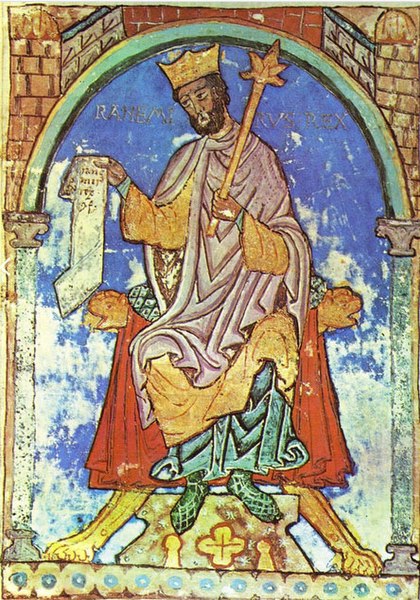Alfonso V, called the Noble, was King of León from 999 to 1028. Like other kings of León, he used the title emperor to assert his standing among the Christian rulers of Spain. He succeeded his father, Bermudo II, in 999. His mother Elvira García and count Menendo González, who raised him in Galicia, acted as his co-regents. Upon the count's death in 1008, Alfonso ruled on his own.
Alfonso V in the Libro de las Estampas
Imperator totius Hispaniae
Imperator totius Hispaniae is a Latin title meaning "Emperor of All Spain". In Spain in the Middle Ages, the title "emperor" was used under a variety of circumstances from the ninth century onwards, but its usage peaked, as a formal and practical title, between 1086 and 1157. It was primarily used by the kings of León and Castile, but it also found currency in the Kingdom of Navarre and was employed by the counts of Castile and at least one duke of Galicia. It signalled at various points the king's equality with the rulers of the Byzantine Empire and Holy Roman Empire, his rule by conquest or military superiority, his rule over several ethnic or religious groups, and his claim to suzerainty over the other kings of the peninsula, both Christian and Muslim. The use of the imperial title received scant recognition outside of Spain and it had become largely forgotten by the thirteenth century.

A Privilegium Imperatoris (Imperial Privilege), as it reads at the top, issued by the Emperor Alfonso VII of León and Castile granting land to a certain Abbot William (bottom, centre) for the foundation of a Benedictine monastery. Behind Alfonso (right) is his majordomo, Count Ponce Giraldo de Cabrera, bearing a sword and shield. At bottom left are Alfonso's sons Sancho and Fernando.
Image: Testamento
Image: Ramiro 2Leon
Image: Ordono III of León leon





